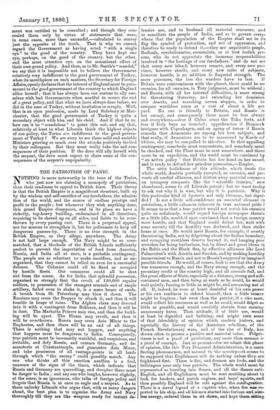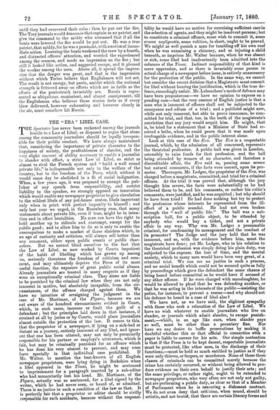THE PATRIOTISM OF PANIC.
NOTHING is more noteworthy in the tone of the Tories, who just now are claiming a monopoly of patriotism, than their readiness to appeal to British fears. Their theory is that the British Empire is a magnificent structure, built up by the wisdom and self-sacrifice of our forefathers, the admira- tion of the world, and the source of endless prestige and profit to the people ; but whenever they wish anything done, this grand Empire disappears, and in its place we have a ricketty, top-heavy building, undermined in all directions, requiring to be shored up on all sides, and liable to be over- thrown by every passing cart. There is a perpetual appeal, not for masons to strengthen it, but for policemen to keep off dangerous passers-by. There is no true strength in the British Empire, as they allege, anywhere. The Army is not half large enough. The Navy might be so over- matched, that a blockade of the British Islands sufficiently perfect to prevent the importation of food from America, Russia, and India all at once, is a probable contingency. The people are so reluctant to make sacrifices, and so un- organised, that they cannot be relied on even for a successful defence. The Colonies could all be fined or occupied by hostile fleets. Our commerce could all be shut out from the ocean. As for India, that splendid possession, organised so strongly that the revolt of 120,000 regular soldiers, in possession of the strongest arsenals and of ample artillery, failed even to shake it, is a mere house of cards. A breath from St. Petersburg may blow it down. The Russians may cross the Steppes to attack it, and then it will tumble in heaps of ruins. The Afghan clans may descend into it with a contingent from Bokhara, and then it will be in dust. The Marhatta Princes may rise, and then the build- ing will be upset. The Nizam may revolt, and then it will be overthrown. Russia may cross Asia Minor to the Euphrates, and then there will be an end of all things. There is nothing that may not happen, and anything that happens must be dangerous to India. Consequently, true patriots must be incessantly watchful, and suspicious, and irritable, and defy Russia, and censure Germany, and de- monstrate at Constantinople, and guarantee Asia Minor, and take possession of all vantage-points in all lands through which " the enemy " could possibly march. Any one who thinks all this exertion needless is a fool, unaware of the signs of the times, which indicate that Russia and Germany are quarrelling, and therefore there must be danger to India ; and any one who laughs, however slightly, at the scare, is an ignoramus, who talks of foreign policy and forgets that Russia is at once an eagle and a serpent. As to those unlucky Liberals who argue that, with so many dangers ahead, the best plan is to organise the Army and Navy thoroughly till they are like weapons ready for instant de, fensive use, and to husband all material resources, and to conciliate the people of India, and so to govern every- where that the population of the Empire shall see in its flag the symbol of protection, and not of oppression, and therefore be ready to defend it,—they are unpatriotic people, Radicals, revolutionaries, economists, or at best foolish per- sons, who do not appreciate the immense responsibilities involved in " the heritage of our forefathers," and 'do not see that every new island, however remote, and every new pro- vince, however sterile, and every new tribe of subjects, however hostile, is an addition to Imperial strength. The more prisoners, the less the warders have to fear. If Britain were conterminous with the planet, there could be no enemies, for all enemies, in Tory judgment, must be without ; and Russia, with all her internal difficulties, is more strong for threatening Germany, and extending her dominion over deserts, and marching across steppes, in order to conquer worthless oases at a cost of about a life per yard. No one is friendly to Britain, and Russia is her enemy, and consequently there must be fear always and everywhere,--fear if China arms the Taku forts, and fear if Italy buys an ironclad ; apprehension if Bismarck intrigues with Copenhagen, and an agony of terror if Russia remarks that Armenians are among her best subjects, and that really, if Armenians are to be massacred by Kurds ad libitum, she may be compelled to interfere. In that appalling contingency, somebody must remonstrate, and somebody must be checked, and the Fleet must be sent somewhere, and there must be an expedition, and the world must be convinced by " an active policy " that Britain has her hand on her sword, and is ready to defend her priceless possession,—Empire.
The utter foolishness of this attitude, which treats the whole world, Austria partially excepted, as enemies, and pre- vents all cordial alliances, and fritters away material resources on trumpery conquests like the " scientific frontier," now abandoned, seems to all Liberals patent ; but we want to-day to ask not why it is wise, but why it is patriotic. Why is this particular kind of hysteria not only virtuous, but digni- fied ? Is not a little self-confidence an essential element in patriotism, a little calmness inherent in true national pride ? It seems to us that a true patriot would not watch his enemies quite so sedulously, would regard foreign newspaper threats as a little idle, would, if once convinced that a foreign country were hostile, and that England could defeat her, wait with some serenity till the hostility was declared, and then strike home at once. He would meet Russia, for example, if overtly threatening India, not by fidgetting about the Indian boundary, and occupying worthless deserts beyond it, and hanging poor wretches for being barbarians, but by direct and great blows in the Baltic and the Black Sea, by effective alliances like Lord Palmerston's with Austria and Sweden, and by making hostility inconvenient to Russia and not to Russia's supposed or imagined possible friends. He would, of course, look to see that the :Army was numerous enough, and the Navy strong enough, and the pecuniary credit of the country high, and all arsenals fall, and the great officers of State, especially at a distance, strong and self- contained men, and then being as ready as he could, he mould wait quietly, fuming as little as might be, and screaming not at all. If, indeed, he were at heart doubtful of his own. power or his own readiness to defend himself, then a little tremor might be forgiven ; but even then the patriot, if a wise man, would collect his resources as well as he could, would fidget" as little as possible, and would carefully abstain from earning unnecessary hates. That attitude, if of little use, mould at least be dignified and befitting, and might •earn some of that friendship of opinion which modern history, and especially the history of the American rebellion, of the French Revolutionary wars, and of the rise of Italy, has shown often to possess a positive and material value. Fidget- tiness is not a proof of patriotism, any more than menace is a proof of courage. Just at present—for we admit this phase of opinion, like this Tory Democrat Administration, is.a. mere fleeting phenomenon, not natural to the country—it-seems to be supposed that Englishmen will do nothing unless they, are frightened first. There is fire, and firemen are fools,.and the bellringers your only true patriots. The whole world must be represented as bursting into flames, and all the ,flamea anti- English, and all Englishmen must be sent scuttling, about to look for buckets, and parish engines, and boys' squirts,Nand then possibly England will be safe against the conflagration. There is a naval legend of a captain who, when fire was. re- ported in his ship, and all his men started into furious.and(nisn- less energy, ordered them to sit down, and kept them sitting until they had recovered their calm ; then he put out the fire. The Tory journals would denounce that captain as no patriot, and give the command to the middy who screamed that if all the boats were lowered the fire would be put out. He was a true patriot, that middy, for he was a pessimist, with a notion of imme- diate action. Lowering the boats weakened the crew by a fourth, and distracted officers' attention, and worried the experienced among the seamen, and made no impression on the fire ; but still it looked like action, and suggested escape, and it pleased the weaker among the men. Above all, it spread the impres- sion that the danger was great, and that is the impression without which Tories believe that Englishmen will not act. The result is not energy, but panic, amidst which the national strength is frittered away on efforts which are as futile as the efforts of the panicstruck invariably are. Russia is repre- sented as ubiquitous, omniscient, and almost omnipresent, till the Englishman who believes these stories feels as if every blow delivered, however exhausting and however clearly in the air, must somehow hit Russia.



































 Previous page
Previous page